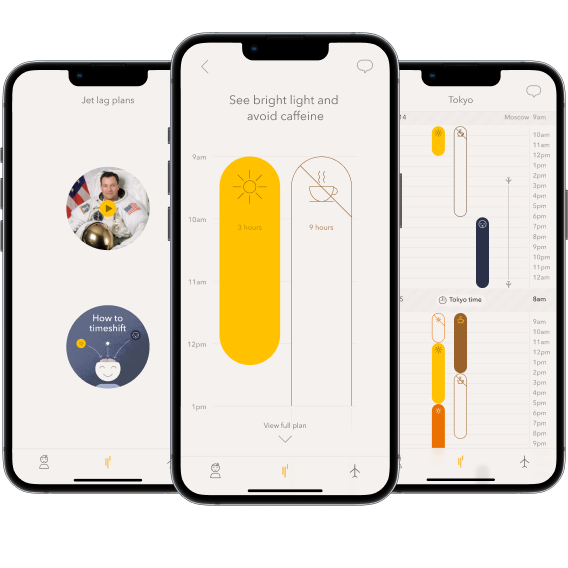Caffeine and travel
Enjoying caffeine can help increase your energy level, but caffeine at the wrong time can negatively impact your sleep quality and reduce your ability to sleep.
When you're tired while traveling, a cup of caffeinated tea or coffee, or a caffeinated soda (equivalent to about 50mg of caffeine) every two hours should help you stay awake. More than that will not make you more alert but may reduce your ability to sleep later. Enjoying caffeine 8 hours or less before bedtime will negatively impact your sleep quality.
For those travelers who want to use caffeine, Timeshifter provides advice on when and how to use it, and when to avoid it, to support the light-dark and sleep schedule that will reset your clock quickly.
What contains caffeine?
Caffeine is present in tea, coffee, caffeinated sodas, chocolate, and in some pain medications. Brewed ‘drip’ coffee and energy drinks tend to have very high amounts of caffeine so only half a cup of these is needed every two hours. Work out the caffeine content of your typical drink so you can plan how much to have.
The science of caffeine
When we are awake, our cells use energy. A by-product of this energy use is an increase in the amount of adenosine in our bodies. Adenosine is part of the sleep regulation system, and is associated with increased sleepiness. Caffeine is an adenosine-receptor antagonist and therefore blocks the sleepiness-inducing effects of adenosine. As a result, caffeine is a highly effective stimulant. Caffeine stays in our system for a long time. It typically has a half-life of three to five hours so if you take 100mg of caffeine at 10am, you will still have 12.5mg of caffeine in your system at bedtime 12 hours later. Having caffeine in your body at bedtime will have a negative effect on your sleep that night.
The correct dose and timing
Using caffeine “little and often”, and then stopping it as long as possible before bed, will optimize the benefits of caffeine and minimize the negative effects on sleep. Caffeine is too powerful for children, and their small size increases the relative dose compared to adults and so caffeine should not be given to children.
App with caffeine advice for jet lag
Enjoying caffeine at the right time can help increase your energy level while traveling, but caffeine at the wrong time can negatively impact your sleep quality and may reduce your ability to sleep. Timeshifter will tell you when you could benefit from using caffeine during your trips to get the maximum benefits, and when to avoid caffeine to avoid disrupting your sleep.
Jet lag is history.
Timeshifter's jet lag app is the most-downloaded and highest-rated jet lag app in the world. Get personalized jet lag plans based on your sleep pattern, chronotype, itinerary, and personal preferences.








